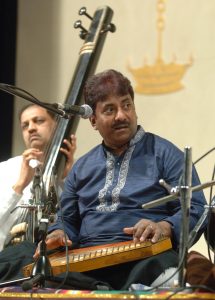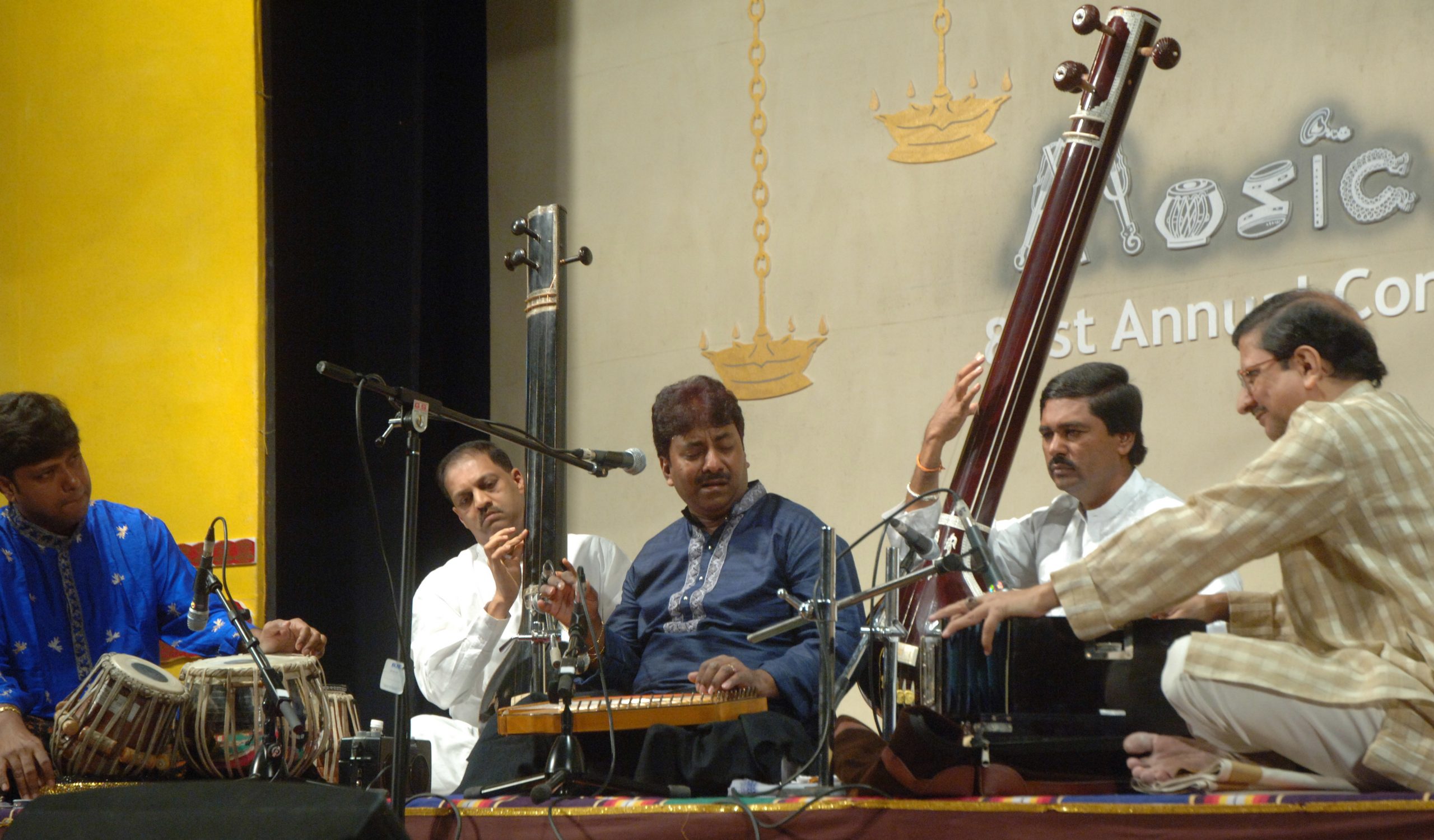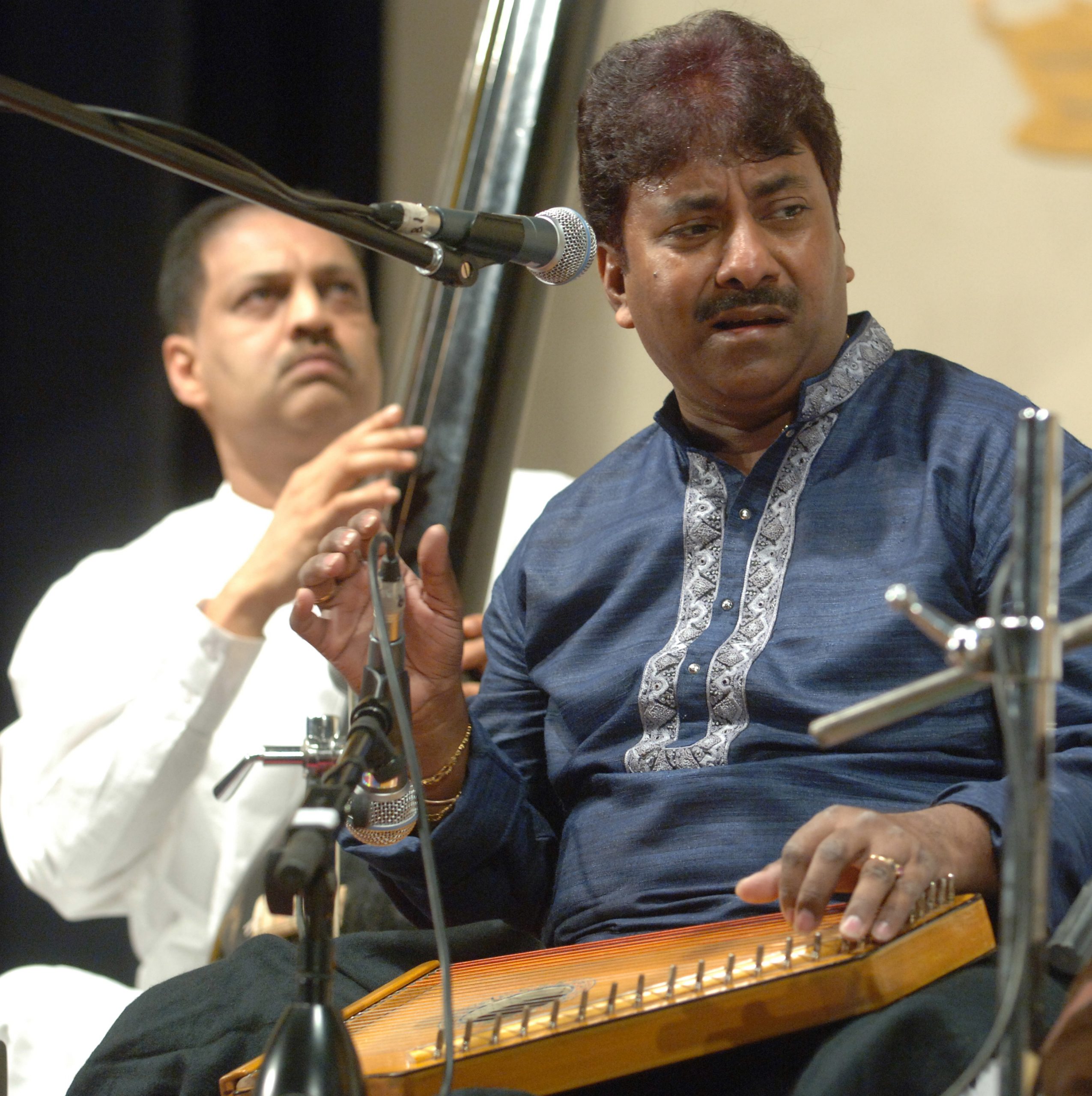
The demise of 55-year-old Ustad Rashid Khan on 9th January 2024 came as a bolt from the blue. He was suffering from cancer and passed away at a private facility in Kolkata. It is an irreparable loss to the world of classical music, especially to Hindustani music.

Born in Sahaswan, Badayun, Uttar Pradesh, on 1 July 1968, his love and passion for music were recognised by his maternal grand uncle, Ustad Nissar Hussain Khan (1909–1993). Rashid Khan made his debut when he was eleven. In April 1980, when Ustad Nissar Hussain Khan moved to the ITC Sangeet Research Academy (SRA), he accompanied his guru to Kolkata. When he was 14, Rashid Khan joined the Sangeet Research Academy; by 1994, he was acknowledged as a musician (a formal process) at the academy.
Ustad Rashid Khan belonged to the Rampur-Sahaswan gharana lineage. Its gayaki is closely related to the Gwalior gharana, which features medium-slow tempos, a full-throated voice and intricate rhythmic play. The Ustad’s official website describes his musical prowess thus: “Rashid Khan includes the slow elaboration in his vilambit khayals in the manner of his maternal grand-uncle and also developed exceptional expertise in the use of sargams and sargam taankari (play on the scale). He is influenced by the style of maestros like Amir Khan and Bhimsen Joshi. He is also a master of the tarana like his guru but sings them in his own manner, preferring the khayal style rather than the instrumental stroke-based style for which Nissar Hussain was famous. His renderings stand out for the emotional overtones in his melodic elaboration.”

Sangita Kalanidhi vidwan G.J.R. Krishnan recalls:
“In 1985 the Festival of India was held in the USA. I had accompanied my Guru and father along with vidwans Sri Vellore Ramabadran and Sri H.P. Ramachar. The sponsorship for the festival had come from the Sangeet Research Academy of the ITC Group. In San Francisco and Washington DC all the artists (both Hindustani and Carnatic) were featured and hence we had an opportunity to interact with each other.
We travelled with Pt. Vijay Kichlu, Pt. Buddhadeb Dasgupta, Pt. Ajoy Chakrabarty and Rashid Khan who was then a teenager. I still remember his singing in the junior slot. But we could tell that he was a prodigy who breathed music day in and day out.
I heard that the training at SRA was quite rigorous and intense and that he was not allowed to perform in public in India till he matured further as a musician. The quality of music that flowed out of him was just ethereal. Of course, in a few years, Ustad Rashid Khan became a maestro who mesmerised audiences wherever he performed.”
Among the most creative and innovative Hindustani musicians of the younger generation, Rashid Khan was committed to preserving the Rampur-Sahaswan style in its fullness, yet helping it grow in new directions. Pandit Bhimsen Joshi described him as “the future of Hindustani music”. A dedicated teacher of music, Rashid Khan served as Guru at the ITC Sangeet Research Academy in Kolkata till 1998. He organized seminars and workshops and also produced many cassettes and CDs of his music. He also ventured into blending Hindustani music with lighter musical genres, for example, the Sufi fusion recording of Naina piya se (Amir Khusro), or in experimental concerts with Western instrumentalist Louis Banks. He also performed jugalbandis with the likes of sitar maestro Shahid Parvez. He also sang in Hindi and Bengali films from 2004 to 2019. The most popular songs are: Aaoge jab tum sajna in the film Jab We Met in 2007, Alah hi Rahem in My Name Is Khan in 2010 and Bol ke lab azad hain in the film Manto in 2018.
Rashid Khan laid the foundation of Shakhri Begum Memorial Trust in memory of his mother Shakhri Begum on 1st June 1999. The Fifth Note Global Centre of Excellence (2009) was set up in 2009. In 2010, the Trust inaugurated “Sangeet Graam” spread over two acres in Agartala, Tripura, conceptualised as a musical village.
For his service to music, Ustad Rashid Khan was conferred the Rashtriya Kumar Gandharva Award by the Government of Madhya Pradesh in 2002. He was awarded the Padma Shri and the Central Sangeet Natak Akademi Award in 2006, the Banga Bibhushan and Sangeet Mahasamman by the Bengal government, and the prestigious Padma Bhushan by the Government of Bharat in 2022.
The Ustad is survived by his wife, two sons, and a daughter. He has become one with the Muse, but he will live on through his music.
Ustad Rashid Khan performed at the Music Academy Academy on 31st December 2007. He was accompanied by Subhankar Banerjee (tabla) and Jyoti Goho (harmonium).
As a tribute to the maestro we share a few clippings from his vocal concert at the Music Academy on 31st December 2007. You can listen to this and many more concerts by the Ustad at the Music Academy-Tag Digital Listening Archives situated inside the Academy’s premises.
Aali re bana — in Chandradhvani raga
Baaton baaton mein beet gayi raaten — in Pahadi raga, Dadra tala
Aaj Radha Brij ko chali — in Bhairavi raga
S. Janaki
(Photos and audio clippings from the Music Academy arhives)